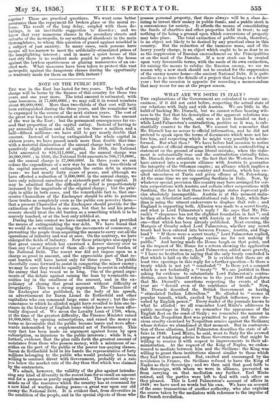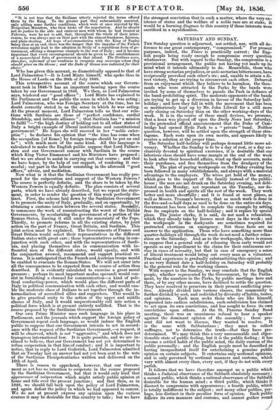WHAT ARE WE DOING IN ITALY?
THE explanations of the Government are calculated to create un- easiness, if it did not exist before, respecting the actual state of our relations with Italy and with Austria. We are little in the habit of backing Mr. Disraeli, but we cannot refuse bearing wit- ness to the fact that his description of the apparent relations was extremely like the truth, and was at least founded on fact ; while Lord Palmerston's contradiction, positive as it was, is sub- stantially counter to the fact. We cannot but remember that Mr. Disraeli has no access to official information, and he did not pretend to speak upon the terms of documents which were not be- fore him, and respecting which he might very possibly be misin- formed. But what then? We have before had occasion to notice, that species of official stratagem which consists in contradicting a, statement on the ground of some literal mistake, when the state-. ment is substantially true and the contradiction virtually false. Mr. Disraeli drew attention to the fact that the Western Powers, have entered -into a separate alliance with Austria to guarantee the integrity of the Ottoman empire; an alliance which implies a special relation between this country and Austria, which has ex- cited uneasiness at Turin and given offence at St. Petersburg. At the same time we are supporting Sardinia in Italy. Now, by whatever special provision this country may have arranged for cer- tain cooperations with Austria and certain other cooperations with Sardinia, the fact is that these two foreign states represent poli- cies absolutely incompatible. Austria is at this moment main- taining an Absolutist anti-constitutional rule in Italy, while Sar- dine is using the utmost endeavours to displace that rule ; and England is supporting both. Allusion was made to a secret treaty, and what is Lord Palmerston's reply ? He says that Mr. Dis- raeli's " eloquence has not the slightest foundation in fact "; and he then alludes to the treaty with Austria as if there were only one—that which has been already published. Next evening, the Marquis of Granby asked Lord Palmerston, whether any secret treaty had been entered into between France, Austria, and Eng- land. ? " If there were a secret treaty," Lord Palmerston replied, " noble Lords would perhaps excuse me for not making it public." And having made the House laugh on that point, and- on the request of Mr. Hume for a return showing the application of the secret service money, Lord Palmerston added more gravely, " I have no hesitation in saying that the only treaty concluded is that which is laid on the table." It is evident that there are at least two openings in this reply for a further question—Is there a. treaty which is not yet " concluded "? Is there yet a compact which is not technicafly a " treaty "? We are justified in thus asking for evidence to substantiate Lord Palmerston's contra- diction, since he himself refers us to the year 1848 and deplores that Mr. Disraeli's assertions respecting the events of that year are " devoid even of the semblance of truth." Now, Mr. Disraeli described the British Government as havitg, " stimulated Italian Liberalism." He alluded to " scenes -4 popular tumult, which, excited by English influence, were de- serted by English power." Every reader of the journals knows to what he alluded: we all remember Lord Minto's addresses to public meetings in Italy ; we remember the appearance of the English fleet on the coast of Sicily; we remember the manner in which the Neapolitan fleet was permitted to pass, and the atro- cious cruelty exercised by Neapolitan armies against the Sicilians; whose defence we abandoned at that moment. But in contraven- tion of these allusions, Lord Palmerston describes the state of af- fairs in 1848. Lord kinto, he said, went to Italy for the avowed vv gof tendering advice to those Governments that might be to receive it with respect to improvements in their ad- ministration. At the request of the Kin% of Naples, we endea- voured. to mediate between him and the Sicilians : the King was willing to grant them institutions almost similer to those which they had before possessed. But, excited and encouraged by the revolution in France, the Sicilians refused to have the King of Naples as their Sovereign ; and we then said that good faith to that Sovereign, with whom we were in alliance, prevented ns from carrying on that mediation. any further. Earl /alto retired, and the parties were left to deal with each other as they pleased. This is Lord Palmerston's account of affairs in 1848; we have used no words but his own. We have an account of the same transactions of another authority, who also explains the course taken by the mediators with reference to the impulse of the French revolution. "It is not true that the Sicilians utterly rejected the terms offered them by the King. To the greater part they substantially assented, only adding some further conditions, which were at once rejected by the Neapolitan Ministers, who then broke off the negotiation. And he should not do justice to the able and eminent men with whom he had treated at Palermo, were he not to add, that, throughout the whole of their inter- course, he was always met on their part with the utmost frankness, fairness, and plain-dealing. All hope of accommodation with the King of Naples being thus at an end, there was the danger that the impulse of the French revolution might lead to the adoption in Sicily of a republican form of go- vernment, offering a dangerous example to the rest of Italy ; and it became important that every encouragement should be given to the establishment of a monarchical form of government in that island. The Sicilians were, there ore, informed of our readiness to recognize any sovereign whom thei' place on the throne ; and the Duke of Genoa was indicated for thou. choice.',
Who has given this account, so diametrically opposed to that of Lord Palmerston ?—It is Lord Minto himself, who spoke thus in the House of Lords on the 20th of July 1849.
This retrospective account of the course which our Govern- ment took in 1848-'9 has an important bearing upon the course taken by our Government in 1856. We then as Lord Palmerston says, tendered our " good offices " ; Lord Minto has explained to the Parliament and the public the sense in which he was acting; Lord Palmerston, who was Foreign Secretary at the time, has no doubt correctly stated to us the sense in which he was acting. At the present moment, Lord Palmerston tells us that our rela- tions with Sardinia are those of "perfect confidence, cordial friendship, and intimate alliance " ; that Sardinia has " a mission to fulfil "—" the high destiny of holding out to all other states of Italy a bright example of hberal institutions and constitutional government." He hopes she will succeed in her " noble enter- pnse ; he declares his opinion that " the time has come when the occupation [of Rome] by foreign troops should be put an end to" ; with much more of the same kind. All this language is calculated to make the English public suppose that Lord Palmer- ston and our Government concur with Sardinia in the course which King Victor Emmanuel and his Ministers have proposed ; that we are about to assist in carrying out that course ; and that we have hopes, by the help of our support, of rendering it suc- cessful ; our part in the labour consisting in the aforesaid "good offices," advice, and mediation. Now what is it that the Sardinian Government has really pro- posed for the cooperation and support of the Western Powers ? The course is perfectly definite, and the share to be taken b3L.the Western Powers is equally definite. The plan consists of several parts, which we have already described, but we repeat the state- ment, in order to render the question of this week perfectly dis- tinct. First, the scheme laid down by the Sardinian Goverment 'fs to promote the unity of Italy, gradually, and on opportunity, by obtaining a customs union between the several states. Seccaxily, to commence the work of reconstructing the worst of the Italian Governments, by secularizing the government of a portion of the Roman States, leaving it still under the suzerainty of the Pope. Thirdly, to promote reforms in all the existing states, by joint action on the part of France Great Britain, and Sardinia. This joint action must be explained. The Governments of France and Great Britain would select their representatives in the different Italian states with great care ; these representatives acting in con- junction with each other, and with the representatives of Sardi- nia, and placing themselves also in communication with in- fluential men of the different states, would openly, and with the conjunction avowed, recommend and support practical re- forms. It is anticipated that the French and Austrian troops would be enabled to evacuate the Roman States. We will not enter into all the consequences to be expected from the course of action thus described. It is evidently calculated to exercise a great moral pressure ; perhaps its most important modus operandi would con- sist in furnishing a channel for communication—a kind of poli- tical conducting-power, which would place the different parts of Italy in political communication with each other, and would ena- ble the moderate class of Italians to act together through the in- termediation of accredited allies and supporters. This would be to give practical unity to the action of the upper and middle
classes of Italy, and it would unquestionably into action a political force which is at present entirely nullified. That is the course proposed by the Sardinian Government. Our own Prime Minister uses such language in his place in Parliament, and the journals which support the foreign policy of Government repeat such language, as would induce the English public to suppose that our Government intends to act in accord- ance with the request of the Sardinian Government,—arequest, it will be observed, which is not "aggressive," and which does not transgress international law. It is quite possible, and we are in- clined to believe, that our Government has not yet determined to refuse cooperation in that line of conduct ; and it is important to notice, that in reply to Lord Goderich, Lord Palmerston admitted that on Tuesday last an answer had not yet been sent to the note of the Sardinian Plenipotentiaries written and delivered on the 16th of April.
There is reason to apprehend, however, that our Govern- ment as yet has no intention to cooperate in the course proposed by the Sardinian Government, but that it would only lend that appearance of cooperation which might satisfy public opinion at home and tide over the present juncture ; and that then, as in 1848, we should fall back upon the policy of Lord" Palmerston, and again defeat the policy in which we had appeared to concur. We do not at present express any opinion upon the various Courses it may be desirable for this country to take; but we have
the strongestconviction that in such a matter, where the very ex- istence of states and the welfare of a noble race are at stake, it would be a burning disgrace to this country if those interests were sacrificed in a mystification.



































 Previous page
Previous page